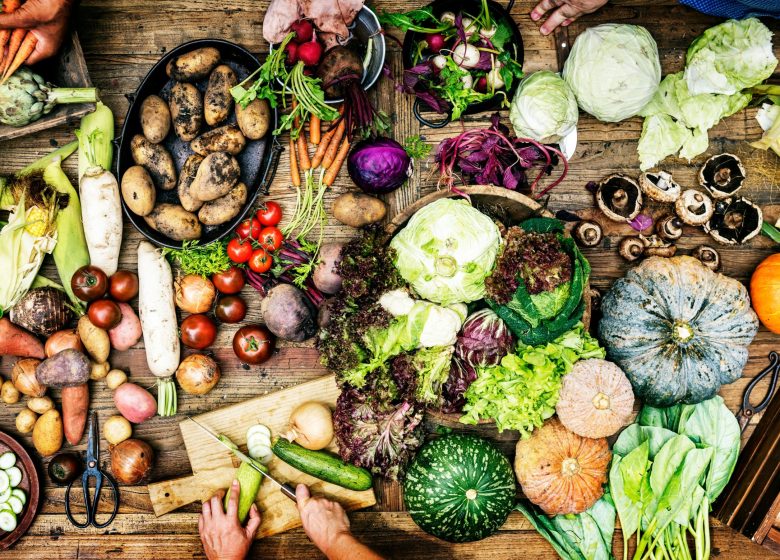World Food Day 2025: How the UK Can Deliver on the EAT-Lancet Vision
- Posted on: 15 October 2025

The NET+ Centre has partnered with Sustain – the alliance for better food and farming. The reflections brought together in this blog for World Food Day come in response to the EAT-Lancet report 2025.
The newly released EAT-Lancet 2.0 report (2025) provides both a wake-up call and a hopeful roadmap. It confirms that global food systems are breaching planetary boundaries while driving poor health — but that rebalancing what we eat and how we produce it could prevent up to 15 million premature deaths each year and restore food systems to a safe and just operating space.
At the Net Positive Centre, we explore how the UK can align climate and health goals across government, business, and communities. Our partner, Sustain, which represents over 100 organisations working for better food and farming, strongly welcomes the EAT-Lancet report’s recommendations — particularly its emphasis on eating more vegetables and pulses, less meat, and tackling unequal access to good food.
Public support for this shift is already strong. Surveys show 66% of people are open to reducing meat consumption, while 78% want to see healthy meals served in schools and hospitals. The direction of travel seems clear — people want change.
Sustain’s Climate Lead Ruth Westcott points out, people’s choices are constrained by the system around them:
“The government needs to make eating healthy food the easy choice that fits into people’s lives. We know people want to eat well, but the farmers who grow our food are barely covering their costs while the big supermarkets rack up profits. The good news is that we can make better diets the easy choice — starting with the food in schools and hospitals. We’ve seen it work in other countries; now it’s time for the UK to step up.”
Bright Spots in UK Policy
While the UK has a long way to go, Sustain highlights that there are positive developments that show how EAT-Lancet principles can work in practice, noting the following areas:
- Public procurement as a driver of change
Each year, around £2 billion of public money is spent on food for schools, hospitals, prisons, and the armed forces. Setting strong national standards so that this food is healthy, sustainable, and largely locally sourced would send powerful market signals.
Aligning public procurement with the Planetary Health Diet could cut food-related emissions by almost 50%, while supporting UK farmers and improving diets across the public sector. - Urban leadership: London’s example
The EAT-Lancet report highlights Transport for London’s (TfL) policies and the London Food Strategy as promising examples of joined-up urban planning — connecting food, health, and climate. By embedding healthier food in workplaces, public catering, and transport-linked spaces, London is showing how cities can make sustainable eating visible and accessible. - Transparency and accountability
The Food Data Transparency Partnership (FDTP) is creating a shared framework for tracking the environmental and health impact of food sold in the UK. Better data can inform consumer choices, guide procurement, and ensure government and businesses are accountable for progress.
What the UK Government Must Prioritise
With the new National Food Strategy in development the EAT-Lancet report makes the following recommendations
Healthy and sustainable public sector food: Aligning food procurement policies with the Planetary Health Diet and serving traditional food is identified as a cost effective investment.
Restricting the advertising and marketing of unhealthy foods, and mandating clear front-of-pack warning labels on unhealthy foods high in sugar, salt, and fat.
A combination of duties on unhealthy foods and subsidies for nutritious foods to make healthier options more affordable, as well as policies to increase the purchasing power of low-income households
Transitioning agricultural payments from emissions-intensive animal products towards under-consumed healthy foods like fruits, vegetables, and legumes and sustainable farming practices
Strong regulations to prevent the loss of ecosystems, such as forests and grasslands, and prevent deforestation in supply chains
Investment in community and indigenous management of ecosystems, and support for producers, especially women to have governance over resources
Reducing food waste through fiscal and regulatory incentives
Justice and equitability through improving pay and workers rights, supporting collective bargaining and tackling exploitation.
Improved governance and representation, with legislation to limit corporate market concentration, protecting policymaking from undue influence, and increasing the representation of women and marginalised groups in positions of influence and policy forums.
Why these recommendations matter for the UK
In its response to the report publication, Sustain notes the following areas of particular relevance to the UK:
- For UK farmers, growing more nutritious plant-based foods is an opportunity for economic growth, but this requires investment from government
- Unequal access to good food is causing a health crisis
- Despite industry efforts to undermine scientific consensus, there is broad public support for eating good diets
Sustain urges the government to:
- Produce a cross-departmental Food Strategy with legally-binding targets for improving people’s access to good food and address the UK’s production gap in healthy and sustainable foods.
- All foods bought with taxpayers’ money (for schools, hospitals, the military and prisons) should reflect a healthy and sustainable diet and directly support high-standard UK farmers.
- An investment strategy for home-grown healthy proteins, including vegetables, pulses and legumes, inspired by the Danish plant-based investment strategy (see below).
- Universal healthy and sustainable free school meals — so every child has a fair start, alongside other targeted policies to reduce diet related health gaps.
From Ambition to Alignment
The EAT-Lancet 2.0 report makes one message clear: climate action, public health, and social justice must move together. The UK already has the building blocks — pioneering procurement policy, local leadership, data innovation, and public support.
On this World Food Day, the goal should be to make healthy, sustainable food the easy choice for everyone — ensuring farmers, families, and the planet can all thrive together.